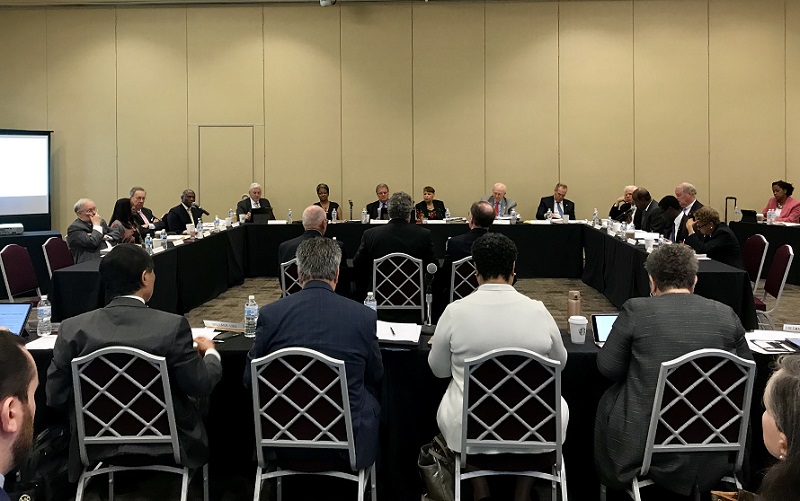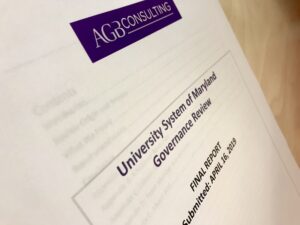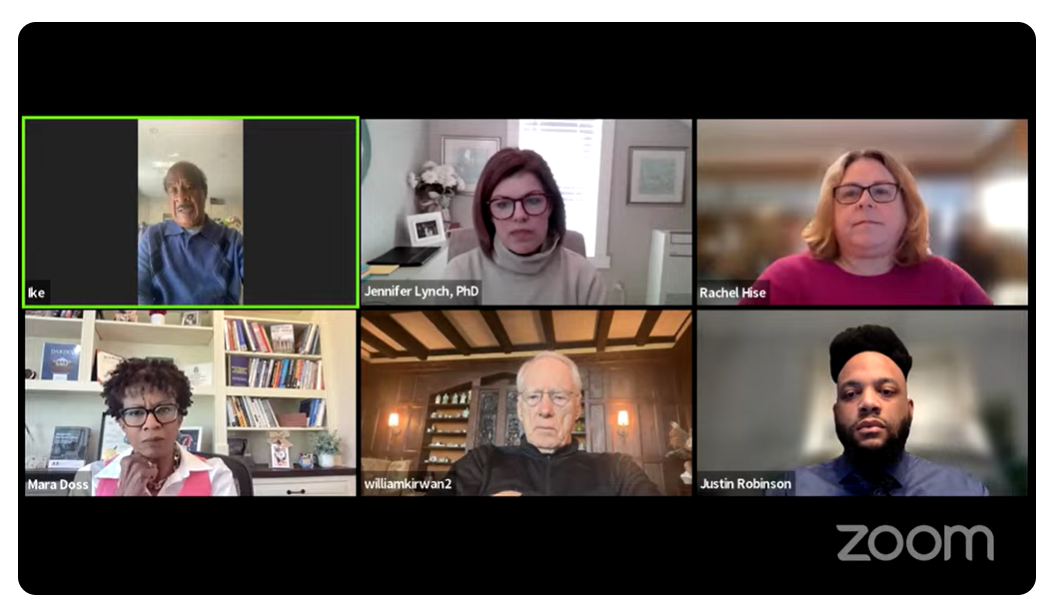Experts: Regents Have Work to Do to Restore Public Trust, Reputation

Officials’ early responses to the practice-related death of football player Jordan McNair threaten the University System of Maryland’s reputation for competent leadership and a series of reforms should be undertaken, a team of experts said Friday.
A report from the Association of Governing Boards of Universities and Colleges concluded that Maryland’s Board of Regents lacked transparency and leadership last fall, as a series of personnel decisions – including to reinstate football coach DJ Durkin, who was later fired by the College Park president – roiled students and the state.
“The McNair tragedy, in addition to its own challenges, highlighted multiple and concerning failures in standard board governance practices. It is clear the governance process failed when it most needed to succeed,” AGB wrote in a report presented to the regents at a meeting Friday in Baltimore.
The report goes on to say that while the board has undertaken crisis management efforts, “it does not replace the need to recognize that well-governed boards do not respond to tragedies as the regents did initially.”
Since the late October personnel decisions, former Board of Regents chairman James T. Brady stepped down from the board and was replaced by Linda Gooden, who committed to reforms and supported legislation in Annapolis this year that, if signed by Gov. Lawrence J. Hogan Jr. (R), will bring further changes to the regents come July.
“Reclaiming public trust, rebuilding a reputation, is … a job. And it takes time. This is a start,” AGB President Rick Legon told the board.
He and two colleagues ran through a litany of changes the board should consider making, but rebuilding public confidence was chief among them.
The consultants suggested a number of changes to the board’s committee structure, including shifting athletics decisions to the entire board, establishing a governance committee, creating a crisis leadership plan, more clearly defining the roles of the board and chancellor, and operating with more transparency, especially when it comes to the biggest decisions.
“We urge that this board take a hard look at the number of times you all go into executive session, and figure out whether or not some of those conversations could be pushed into open session,” Legon said. “… That would go a long way to reclaiming some of the trust that’s been lost.”
The board’s meetings should feature more robust and public conversations, Legon said.
“Full board discussion of all-important issues – whether crises, serious problems, or long-term strategic matters – leads to wiser choices and a greater degree of support within the board,” the report states. “A culture that displays candor in the sunshine sends a message to stakeholders that the board is addressing the most important issues facing the system and the state. A board that focuses on politeness in public might be viewed as scripted and informed solely by staff reports.”
The report presented by AGB was created after a three-month review that included more than 50 interviews with current and former regents, chancellors, campus presidents, students, faculty and state lawmakers.
Other concerns that were raised included concerns about racial tension, a tendency – real or perceived – that the board focuses almost exclusively on the University of Maryland College Park and Baltimore campuses, and a concern about politicization of the board.
AGB recommended that the state consider setting up independent selection commissions for regents and wrote, perhaps too late, that the legislature should consider deferring any legislation related to increased political appointments to the board.
While Gooden and system leadership supported a bill in Annapolis this year that would add four new members to the board, including two appointed by the speaker of the House and Senate president, AGB wrote that some of those interviewed said the board was “highly sensitive politically as it is” and changing the appointment system would add a partisan element to the board.
“You need to defend against any compromise on any politically motivated appointees who become more watchdogs than independent regents,” Legon said. “Because that not only effects Maryland. As Maryland goes, so go other systems.”
 To address concerns about racial tensions, the board should establish a working group on equity and diversity and a public commitment to the system’s strategic goal of ensuring inclusivity “regardless of ability, background, gender, gender identity, race or ethnicity, creed, perspective or national origin.”
To address concerns about racial tensions, the board should establish a working group on equity and diversity and a public commitment to the system’s strategic goal of ensuring inclusivity “regardless of ability, background, gender, gender identity, race or ethnicity, creed, perspective or national origin.”
“This laudable aspiration will require commitment from the board and system leadership in light of longstanding divisions, a history of exclusion within the higher education system, recognized racial tensions on the flagship campus, and a lack of resolution of the Coalition Case,” the report states, referencing an ongoing lawsuit regarding a diversion of resources from some of the state’s Historically Black Colleges and Universities. An update on mediation efforts in that case is expected at the end of April.
Gooden thanked AGB for the report and announced that a six-person special committee comprised of a who’s who in state education leadership will help guide the board’s implementation of the report recommendations.
“We realize we have a lot of work to do to turn the corner,” Gooden said. “Some of it very fundamental.”
The AGB report marks the first such external review of the board in two decades.
“As I’ve stated previously, this opportunity for reflection is timely regardless of the circumstances that initiated it. It was time,” Gooden said.
The special committee members are Norman Augustine, a former regent and former CEO of Lockheed Martin; Calvin Butler, CEO of Baltimore Gas and Electric and a member of multiple education-related boards; Chancellor Emeritus William “Brit” Kirwan; Molly Broad, former president of the American Council on Education; Patricia Florestano, former regent and former state higher education secretary; and Rushern L. Baker III, former Prince George’s County executive.
The committee will meet with the board quarterly starting next month.
The regents met for nearly four hours on Friday. Other items on the agenda included a briefing about state ethics and financial disclosure laws and the board’s acceptance of a general framework that will be used to create a new policy on grievances filed by university employees.
During the legislative session, lawmakers reduced the chancellor’s office budget by $642,600 – the same amount as Chancellor Robert Caret’s salary – after reports that an employee who raised ethics concerns about an email from the chancellor promoting a business was later the subject of retaliation. The board has not publicly identified how the cut will be absorbed.
The new policy would direct grievances filed against the chancellor to the Board of Regents.
The board also met in closed session to discuss, among other things, an unidentified person’s employment contract, changes in leadership of the board’s finance committee and implementation of the AGB report.
Editor’s note: This story was updated to reflect the board’s personnel decisions in October and Coach DJ Durkin’s subsequent firing. Athletic Director Damon Evans was not fired.
Did someone forward this to you?
Get your own daily morning news roundup in your inbox. Free. Sign up here.




 Creative Commons Attribution
Creative Commons Attribution